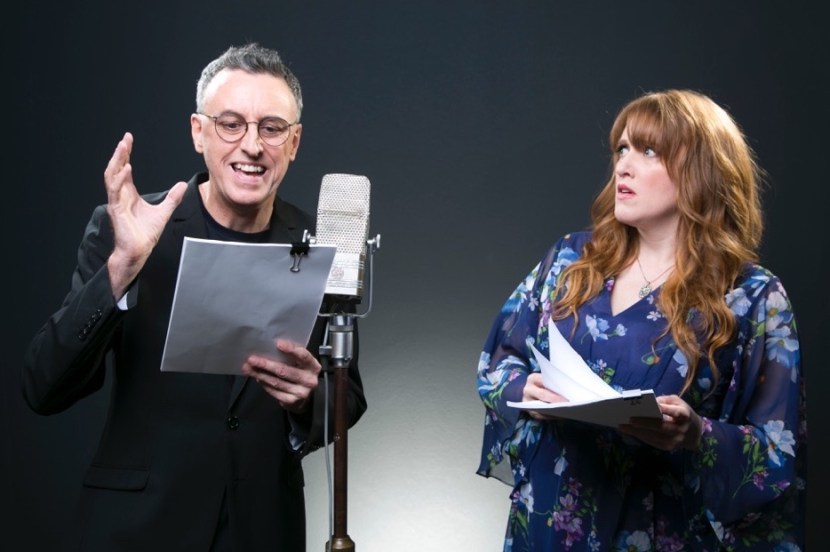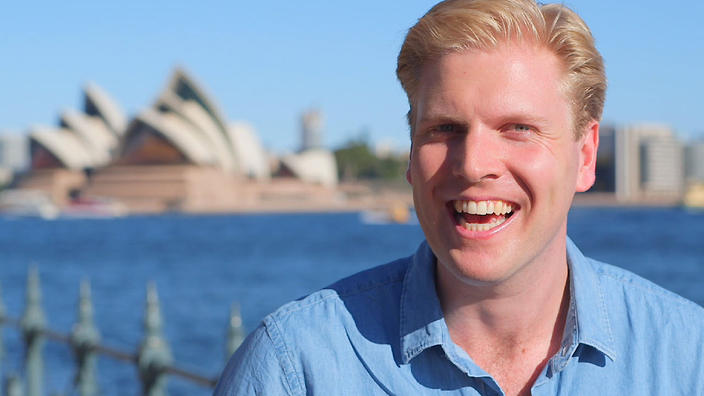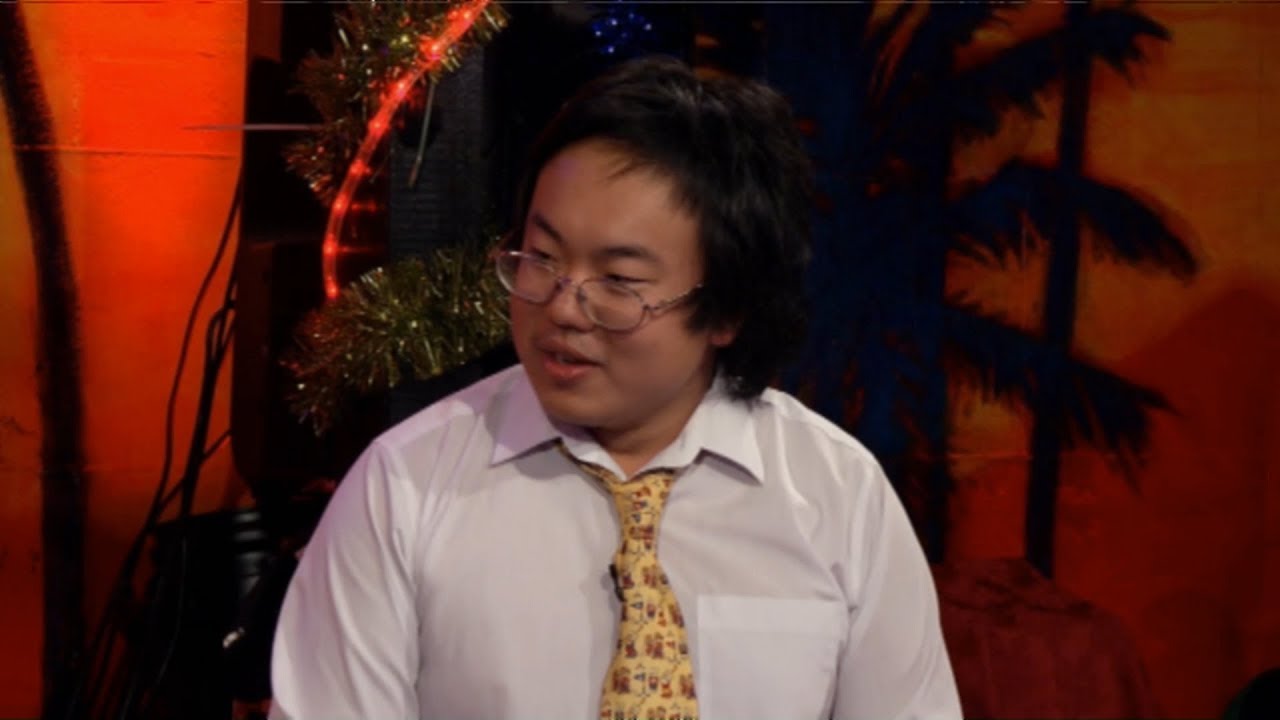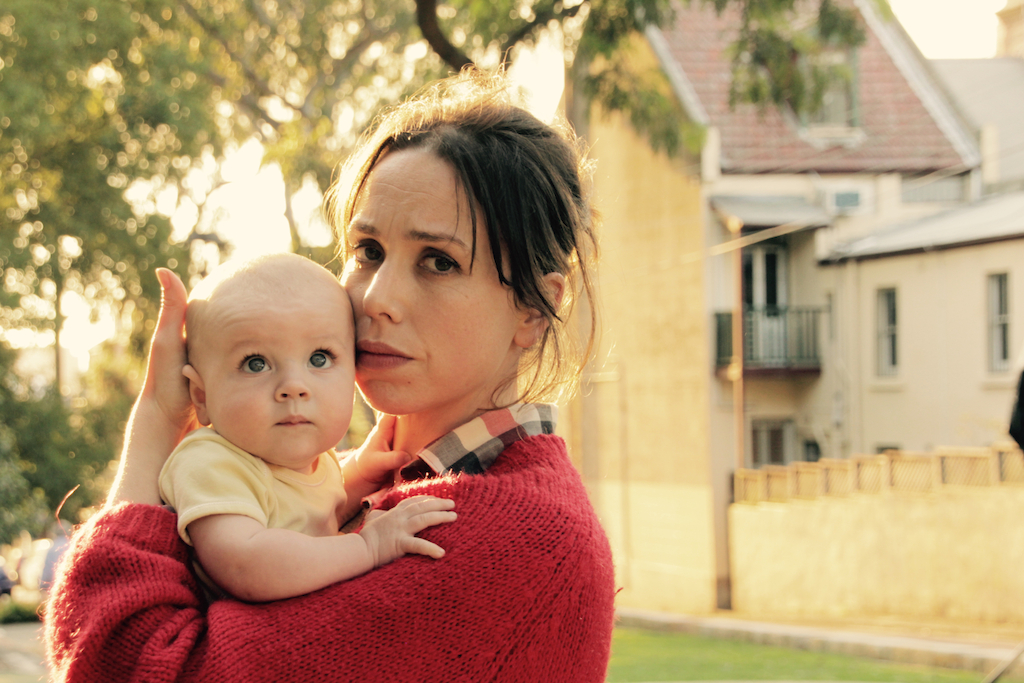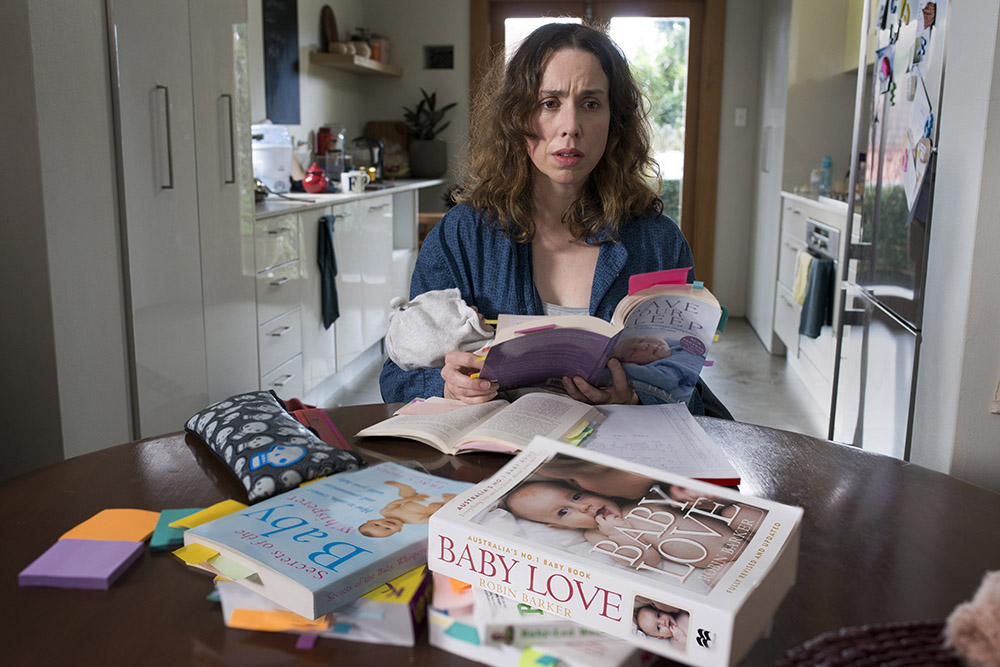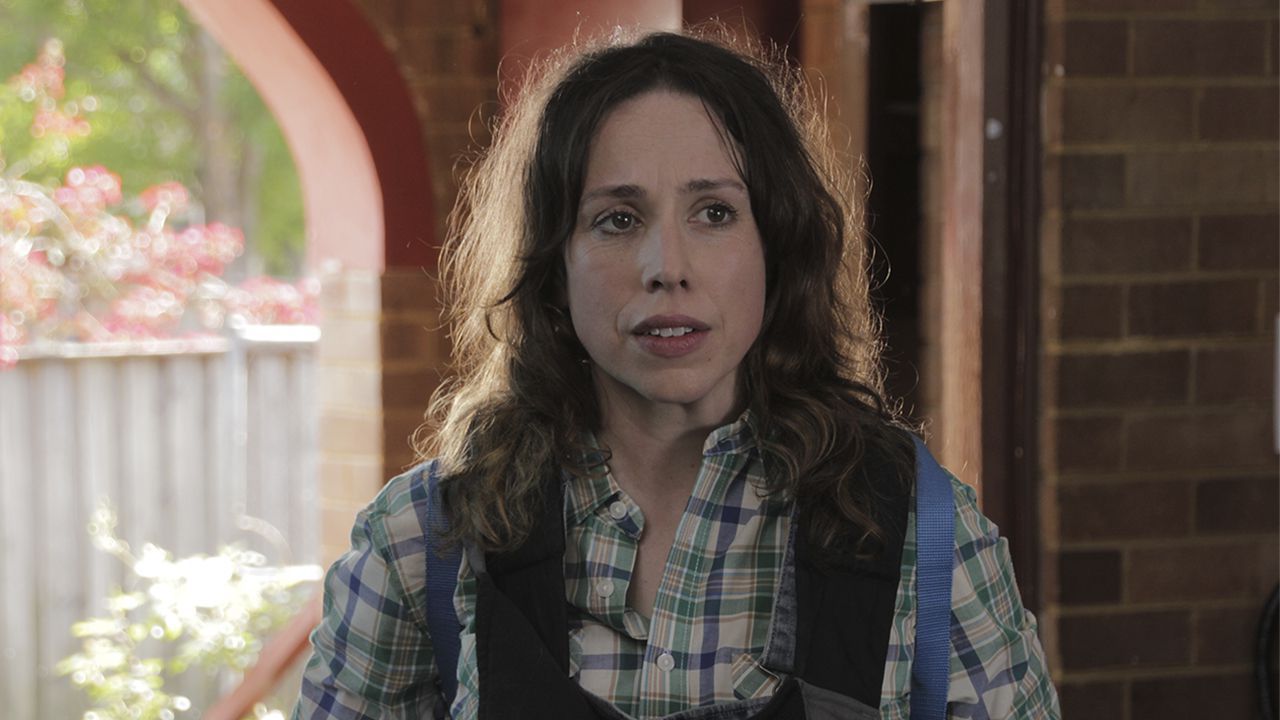Australian Tumbleweeds
Vale The Ex-PM season 2
It’s difficult to pin down exactly why season 2 of The Ex-PM didn’t explode like a comedy bouncing bomb, unleashing a tidal wave of comedy that swept away all before it. It really should have: Shaun Micallef is Shaun Micallef, the rest of the cast weren’t too shabby either, the set-up was a lot tighter after the wobbly wanderings of season one and the whole package was, as they say in wrestling, the total package. Concept-wise, it’s five stars from us.
The word that came to mind upon watching the finished product was “polished”. The final episode wrapped up all the mysteries nicely, gave everyone a few decent comedy moments, had a solid political point that we can all get behind and threw in a rousing speech from Dugdale that ended with him holding a V for Vendetta mask in a very funny, out of almost nowhere pop culture reference. Not to mention you can’t go wrong with the tried-and-true end credit “here’s where they all ended up” bit.
(plus putting “For John” in the credits did bring a tear to the eye. John Clarke wasn’t a huge part of this show, but it was always a joy to see him scheming away)
And yet while the end result was definitely good, it probably should have been better. It was hard not to come away feeling that while the show had a great cast, it never really took full advantage of them. For one thing, Micallef was usually playing it straight; why? Okay, because he looks like a leading man and the show was structured to have him as the seemingly rational center around which craziness revolved-
-well no; obviously the initial idea back in season one was to have his biographer as the sane one while Dugdale and family would all be off-kilter. But when you have Micallef facing off against an unknown actor who is good but not Micallef-level good, it’s not surprising that the focus swiftly shifted to making him the center of things.
But having him largely playing the straight man was a waste of one of the funniest performers on Australian television, while having him play a character somewhat out of the loop – he was surrounded by various schemers manipulating him even when he had his own agenda – meant that he wasn’t driving the plot. This kind of thing worked on Frontline because while Mike Moore was a dim bulb, he was the whole focus of the show: here while the aim was to get Dugdale elected, which often meant having him do and say as little as possible.
We’ve mentioned before that we’re big fans of Micallef’s previous sitcom, Welcher & Welcher, and in part that’s because there Micallef got the structure right: he played the central character whose schemes and scams drove the story, while his grounded wife (Robyn Butler) was the foil and his sidekick (Francis Greenslade) aided and abetted him. But in The Ex-PM he played a largely straight character at the mercy of others, a man who was funny but not stand-out funny in a story that had plenty of good lines and funny characters but not all that many classic situations.
Look, a Micallef-led sitcom is always going to be in the top three comedy events of the year simply because he’s a very funny man with great taste in collaborators. If the ABC announced that another three seasons of The Ex-PM had already been booked in, there’d be no complaints from us. But compared with Micallef’s other output, this was a solid B+. And there aren’t enough people capable of making A-grade material around for us to be fully happy with that.
The Letdown
Press release time!
Friday, December 1, 2017 — The ABC today revealed a diverse and unmissable line up for the first half of 2018, including a variety of new programming across all genres, Australian premieres and the return of audience favourites. This complements the impressive Comedy, Entertainment, Indigenous, Arts and Children’s 2018 programming already announced.
[…a bunch of stuff not relevant here…]
By popular demand, Julia Zemiro’s Home Delivery and You Can’t Ask That are back on screens in 2018, delivering more unscripted, personal and bold moments for ABC audiences. Comedy favourites, Gruen, Mad as Hell and Hard Quiz are back to inform and challenge audiences again in 2018. And, 2018 sees lifestyle favourite Gardening Australia blossom into a new, hour long format on Friday nights, kicking off on January 26th – giving Australians more of what they love.
Well, that was pretty gosh darn disappointing. Seriously, we expected at least a couple of new comedy titles to be part of this announcement – especially as the “already announced” comedy* barely seemed enough to keep the all-new ABC Comedy channel from falling off the dial.
(calling Hard Quiz a “comedy favourite” is definitely stretching things more than a little too)
While the ABC usually sits on a few titles that are due later in the year, off the top of our heads there’s not a lot of decent stuff that really could be coming up. The Chaser seem to have given up on comedy entirely (at least on the ABC), while most of the decent sitcoms (Utopia, The Ex-PM) have run their course and won’t be back. Get Krack!n should be returning, but it’d have been nice to have that confirmed.
Oh yeah, there’s also this:
Paul McDermott returns to ABC to host new quiz show Think Tank
Friday, December 1, 2017 — What do tram drivers know about Ancient History?
What do medieval scholars know about Pop Trivia?
What do educational psychologists know about the Animal Kingdom?
Welcome to Think Tank…Hosted by grandmaster Paul McDermott, Think Tank is an exciting new nightly quiz show at 6pm on ABC TV. Each episode sees three contestants go head to head, pitting their general knowledge and their general luck against each other. To win the game, they need to pass five, challenging rounds. Helping or maybe hindering them in their pursuit of game show glory, is the Think Tank.
The Think Tank features eight relatively ordinary Australians with an extra-ordinary love of trivia and general knowledge. The eight form a ‘repository of wisdom’ from which our contestants on Think Tank can draw.
But be warned…Our Think Tankers – like Australia itself – are made up of a diverse mob of people plucked from all walks of life. They are there to help but sometimes they get it wrong.
What happens then? Do you trust your instincts or trust the masses? Do you tag along with popular opinion or strike out on your own? The excitement, drama and brain-twisting fun of Think Tank comes in these moments of interaction between our contestants and the Think Tankers.
The ringmaster for this cavalcade of mind-expanding madness will be the shy, self-effacing Paul McDermott.
“Australia is about to meet eight wonderfully funny, warm and intelligent people,” McDermott remarks. “Oh, and I’ll be there too, The Marvellous Mr Me! How could anyone resist?”
This is game show with a difference, one the whole family can enjoy. Join us for the battle of brains, the thrill of victory, the hilarity of defeat. Come for the competition, witness the wonder, meet the Think Tankers and who knows – you might just learn a thing or two.
“[It’s a] game show with a difference, one the whole family can enjoy”. Unlike all those adults-only after-dark game shows clogging up our airwaves, of course.
(ok, it’ll probably be a passable time-filler in a timeslot where quiz show fans can find it and everyone else can pretend it’s not on. If only we could do the same for “comedy favourite” Hard Quiz)
*this list consists of Squinters, Sando, and Back in Very Small Business. It remains unclear whether they’ll air on the main ABC channel or ABC Comedy
Childproof is great. Here’s why we think it got rejected
Tony Martin and Sarina Rowell spent three years trying to sell Childproof, their sitcom about a childfree couple, but were told it was too niche an idea, and that only those without children could possibly relate to it.
That sounds ridiculous, right? There are heaps of people out there who’ve chosen not to have kids, and even those with kids remember what life was like before they became parents. What’s not to relate to?
Also, why do you need to be able to “relate to” a show? It’s a sitcom, you only need to find it funny.
Now that Martin and Rowell have turned the unproduced scripts of Childproof into an audio sitcom, and released them as podcasts, whatever the reasons that no one wanted to make the show were, one thing’s for sure: they look ridiculous. Within days of release, Childproof went to #2 in the Australian podcast charts, so clearly quite a few people can relate to it. Also, it’s a really funny show.
The cast, which includes Martin as Ian, Geraldine Quinn as his wife Jennifer, and Roz Hammond, Andrew McClelland, Damian Cowell, Lachy Hulme and others in a variety of roles, do a great job of bringing what is a TV script to life in audio only. And with production by Matt “The Pots and Pans” Dower (Get This) and Jay Mueller (producer of The TEAM Effort and Triple M Melbourne’s The Hot Breakfast), plus Pete Smith reading out the opening and closing credits, Childproof sounds as good as a podcast sitcom can.
So, great cast, great production, great script. What’s not to like?
Okay, some of the gags, having been written for TV, are never going to be as hilarious in audio only. For example, there’s a running joke about how whenever Ian arrives at the commercial radio station he works at, the poster advertising the breakfast team is being removed and replaced by a poster for a new but strikingly similar breakfast team. It’d be hilarious on TV, as a recurring background gag, but it works less well when Mueller is reading it out in the form of stage directions.
Happily, though, most of the laughs in the script are in the dialogue, and they work very well here. Ian’s description of a Scandinavian murder mystery that he and Jennifer are watching doesn’t need visuals to be hilarious, nor does the horrific party scene where Ian and Jennifer have to deal with the smug parents of small children telling them they’re unfulfilled or “must hate kids”.
So, we come back to the question of why this never got made for TV in the first place. Here’s our theory: Australian TV, right now, really hates anything that has a strong point of view. So, anything that might alienate the sort of people who watch TV is out. Right out. And, unfortunately for Childproof, that includes any program featuring characters who are proudly different from the norm.
That scene where Ian and Jennifer have to justify their childfree life? There’s one of them at every party attended by middle-aged couples. On one side, there’s the childfree couple, happily talking about how they enjoy late nights in front of DVD boxsets. On the other side, there’s everyone else: the sleep-deprived parents of young kids with no time for hobbies of their own and no energy left to tolerate their friends who still drink and enjoy life.
And, weirdly, when those parents sit down in front of the TV, what they want to watch isn’t a comedy they’re going to find challenging to watch.
Perhaps that explains The Letdown: no one would ever commission it because it’s funny, but they might because it’s “relatable” to enough people.
Are You Free?
In case you missed SBS’s Privatise Now: The Feed’s End of Year Special, here’s all you need to know: it was a showcase for Mark Humphries. You know Mark Humphries, right? He came out of nowhere to be one of the smug guys on WTF!, then became one of the smug guys on The Roast, and for the last few years he’s been one of the smug guys on The Feed. If you’ve ever wanted to be trapped in a hall of mirrors where smugness is reflected back at you so many times it’s impossible to tell where performance ends and reality begins but we’re going to guess a Sydney private school has something to do with it, dive right in.
That said, the show itself wasn’t half bad, and not just because it had a joke about “how do you get a cinema all to yourself? Just find one showing a new release Australian film” – it also had another joke where Marc Fennell was interviewing himself and asked “You’ve been hosting The Feed for five years… when do you think people are going to start watching?” C’mon, jokes about how the Australian media is shit are always going to find a good home here.
But Humphries… what’s going on there? It’s so weird that he’s had a career stretching back close to a decade now, because his entire act is that “fake newsreader” thing that Charlie Pickering does only without the extremely thin layer of humanity that Pickering has leveraged into becoming the outraged voice of a disinterested generation or whatever the fuck he tells himself at night. Or even that “fake newsreader” thing that Shaun Micallef’s been doing only he’s literally a comedy genius who can get laughs by lifting an eyebrow whereas Humphries just looks like a real estate agent who’d combust if exposed to direct sunlight.
Clearly being a fake newsreader is working out for Humphries because that’s pretty much all he’s ever done. But the trick to making the fake newsreader character work is you have to show a glimpse of something real under the smarm – and that something adds depth to your character. Pickering has a bunch of fake outrage that… well, it’s not actually believable, but as he’s often covering stories that are legitimately outrageous it works well enough. Micallef is trying to go along with the insanity he’s reporting on but he never quite manages it – and again, he’s usually reporting on insane stories so it all hangs together.
But Humphries is just smug. He’s doubling down on a characteristic a regular newsreader already has. There’s no comedy angle to his performance beyond “Ha ha, I’m even more arrogant and smug than the rest of these arrogantly smug smug arrogant jerks”. Not that there’s really any room for a comedy angle in his performance, seeing as he’s the front man for the kind of topical news humour that made shows like Hungry Beast into the kind of hit that wasn’t in any way a hit and has since made The Feed into a show where even the on-air cast are making jokes about nobody watching it.
So rather than playing an actual comedy character, on The Feed he’s mostly there to present but not distract from jokes designed largely to congratulate the viewer for having the kind of political views that in theory make the jokes funny: on this special he presented jokes that were more along the lines of “I don’t know who that Ray Martin guy is, but he shows promise” and an extended sketch about how Malcolm Turnbull made a shithouse basketball shot. Wait, they’re the same kind of joke.
Still, at least those involved were willing to burn bridges, what with that joke about The Chaser’s ever expanding cast and “Tugger” the sports commentator, who was basically a slightly more articulate version of Micallef’s old Milo Kerrigan character. After all, in-jokes about other comedians are always a great move when it comes to forging a career in Australian comedy.
Just look how well it’s worked out for us.
Vale Aaron Chen Tonight
So, Aaron Chen Tonight ended last week. Tucked away on late night ABC2, it was a show that was easily missed, which is a shame as it’s been one of the most interesting new comedies for years.
Filmed in a real-life comedy room in Sydney, this started out as a shonky local take on US-style tonight shows – complete with opening monologue, guest stars on the couch and interjections from regulars – mixed with sketches and filmed segments. And with a lot of the material clearly written in the days leading up to the show, it had a real seat-of-their-pants vibe to it. In fact, it’s probably the closest we’ve had to a new version of The Late Show or an Aussie Saturday Night Live – raw, anarchic and a bit weird. What’s not to like?
Except…and, sorry, here comes the but…it wasn’t very funny. Because whereas The Late Show cast had worked together for years and were pretty good at writing decent material in a short amount of time, and whereas Saturday Night Live has always employed a crack team of writers who can churn out good material in mere hours, Aaron Chen Tonight had neither of these. Sure, the cast had an obvious rapport and a shared approach to comedy, but they didn’t have a lot of experience of making this sort of show. And most of the time it felt like their material was the sort of stuff they could get away with in a small club, but wouldn’t be material they’d perform at MICF or in Edinburgh…which means it wasn’t really good enough for TV either.
To be fair to Aaron Chen Tonight, it was very deliberately on ABC2 where almost no one was watching, and by the end of its run it looked like it was starting to find its feet, but now it’s ended. Possibly for good. Which is a shame, as a few more weeks could have resulted in something really good.
When Lorne Michaels pitched Saturday Night Live to NBC, an executive asked him “How long do you think it will take to get good?”. Michaels replied, “About six weeks”. “I’ll tune in in week 6”, said the executive. Which is all very well if you’ve got more than six weeks, and it’s 1975 when executives had huge budgets and less worries, but not so good if you’re Aaron Chen Tonight.
We’d like to see this show come back – it’s got enough promise to justify a second series – but we’d also like to see it better and more topical. In a week when Australia voted for gay marriage and got into the World Cup, it would have been nice to see these referenced in Chen’s material, rather than the cold weather which Sydney was enduring at the time the show was filmed. If this is supposed to be a US-style tonight show, shouldn’t it be topical? Sure, Australia mostly sucks at topical comedy, but on a freewheeling show Aaron Chen Tonight anything might work.
Family Comedy doesn’t mean the same thing as Comedy Family
Press release time!
Filming underway on ABC’s New Family Comedy series Sando
Monday, November 20, 2017 — ABC and Screen Australia in association with Create NSW are pleased to announce that filming is underway in Sydney on the new six-part family comedy/drama series Sando, from the team at Jungle.
Starring the much-loved Genevieve Morris (No Activity) as Sando (aka Victoria ‘Sando’ Sandringham) in her first TV series lead role, the ensemble cast includes Firass Dirani (House Husbands), Phil Lloyd (The Moodys) Rob Carlton (Paper Giants), Krew Boylan (Schapelle), Adele Vuko (of online comedy sensations Skitbox), Uli Latukefu and newcomer Dylan Hesp.
‘Sando’ (Genevieve Morris) is Australia’s queen of the discount furniture package deal. She’s built her empire on being a down-to-earth larrikin and is something of a national treasure – to all but her family. They banished her a decade ago when her one-night stand (and resulting pregnancy) by her daughter’s fiancé (Firass Dirani) was shockingly revealed at his wedding to her daughter (Krew Boylan). Now, after a health scare, her career on a precipice and her professional nemesis (Rob Carlton) primed to push her into the abyss, Sando is determined to rekindle the family relationship. She needs them, and in spite of their initial apprehension…and unbridled hatred…soon they’ll discover they might actually need her too.
Created and written by Phil Lloyd (The Moodys, Here Come the Habibs) and co-created by Charlie Garber, the series will be directed by Erin White (It’s a Date, Little Lunch) and the Van Vuuren Bros. (Bondi Hipsters, Soul Mates), and produced by Chloe Rickard (No Activity, Here Come the Habibs).
Sando will film in Sydney over the next six weeks and air on ABC next year.
Look, we know it’s the job of a press release to sell something that perhaps is a bit on the whiffy side, but calling Genevieve Morris “much-loved”? No slight on Ms Morris but in late 2017 with John Clarke gone we’d struggle to call anyone in Australian comedy “much-loved” aside from maybe Magda Szubanski and she’s barely done comedy since Kath & Kim.
Genevieve Morris, on the other hand, has a comedy career that largely involves five years on Comedy Inc, one of the worst sketch shows this country has ever produced. Then there’s her work on Wednesday Night Fever, a show about which the less said the better, and Live From Planet Earth, which was, to use an industry term, “shit”. Plus a lengthy run on City Homicide, which was probably as big a laugh-getter as any of the other shows mentioned here.
But clearly she’s been doing something right, because appearing in a run of shows like that would have killed a lesser comedian’s career stone dead. And hopefully whatever it is that she’s been doing can draw an audience to a show that looks like someone at the ABC realised that they had nothing to fill the “wacky lower-class family” slot now that Upper Middle Bogan and The Moodys were over and figured a show loosely based on a dim recollection of Ken Bruce would work as well as any.
Oh wait, the press release calls it a “comedy/drama” which these days isn’t even code for “unfunny comedy”. If you’re trying to sell a show to the nation and that’s the best pitch you’ve got, we’re all in a lot of trouble.
Vale Gruen, or What Is Dead May Never Die
Aside from how to hate life in all its forms, what did we learn from the latest season of Gruen? Because if you ask around, that’s generally seen as Gruen‘s big appeal: it’s a show that educates people about how the media, and advertising in particular, works. As education is obviously a good thing, Gruen is therefore a good show. Enjoy!
Well fuck that. It’s hard to pick one rock-bottom moment from this years endless parade of smug fuckwittery, but we’re going to go with the time millionaire Gerry Harvey was described as a loveable Aussie battler. Because he’s not. He’s an extremely wealthy man who has spent the last decade fighting against literally anything that could save Australian consumers money. But because he comes across as a cranky old coot in his commercials, he’s winning when it comes to media branding. Which, according to Gruen, is a shitload more important than reality. Remind us: what do we call an educational program based on lies?
So one more time for the folks up the back: Gruen isn’t a show that lifts the lid on advertising. Gruen is advertising: it’s a 35 minute weekly commercial for the wonders and glories of the business of advertising. You know how commercials for a product can tell you facts about that product and still be an advertisement for that product? That’s what Gruen does: it presents the facts in a slanted way to give the impression of a fair and balanced take while really pushing a biased message that’s in no way in the best interests of the consumer.
Once you realise that [less of the “wake up sheeple”, ok – ed] it becomes clear why Gruen is one of the dullest shows on television. Sure, if you take it at face value it’s a passable panel show where a bunch of millionaires sit around explaining why poor people are suckers, but upon realising that every single segment is advertising the concept of advertising it becomes as stale and predictable as any other commercial. No matter where a segment starts on Gruen, it always ends up at the same point: marketing is the solution to all problems. Which might seem fair enough – it is a show about marketing and advertising, after all – but it’s the reverse of how just about every other panel show works.
Everywhere else you go, the point of the show is the subject. Sports shows are about sports, political shows are about politics, and so on. When they discuss issues, they start with a story coming from their area of interest – “this is a sports story” or “this is a political story” – and then work out from there to find a solution. They’re basically telling a story: we know where they’re starting from and it’s the journey towards a somewhat unknown destination that provides the interest. Will the panel fight? Will someone have a crazy suggestion? Let’s find out!
But on Gruen it’s the reverse. Each episode the topics change – one week it’s AI home assistants and consumer boycotts, the next it’s Taylor Swift has a new album out – but the answer is always the same: marketing. Are AI home assistants a malware pipeline that promise to make home appliances as fun to deal with as a 1996 VCR? Why are consumer boycotts pretty much the only tool left to reign in corporate excesses? Has Taylor Swift progressed musically beyond the EDM-influenced pop that’s increasingly yesterday’s news on the charts? FUCK YEAH MARKETING.
And this is as boring as fuck because marketing is as boring as fuck. The topic is the interesting thing: the solution is just a bunch of buzzwords designed to render everything down to the same level of “how can we extract as much money out of the client as possible”. It’s like someone created a show that each week tackled the biggest issues facing our society and said the solution to every single problem was exactly the same: more tax cuts for the rich. Oh wait.
Unsurprisingly, this is now how a large chunk of our media works. Whether you’re Andrew Bolt or Helen Razer, one increasingly popular path to media success is to position yourself as someone with all the answers. You’re the only one who sees how our society really works so you’re the only one with the key to figuring it all out, and it doesn’t really matter what the answer you’re selling is (Communism! Tony Abbott! Marketing!) just so long as it’s even slightly convincing as an answer to the confusion of modern life.
Of course, the people behind Gruen know that this is a media strategy that’s extremely successful when it comes to promoting a product: they work in marketing. We just wish someone there worked in entertainment.
The Letdown has let us down
That’ll teach us to be optimistic. When we watched the first episode of The Letdown we saw some potential in the series. Now, four episodes in, we’re just waiting for it to end. If we were the mother of a small child and we were thinking about The Letdown, our face would look like this. But more on Alison Bell’s face later in this blog…
The Letdown wasn’t like most Australian sitcoms, which start out okay and then continue to be okay but are mainly kinda meh. The Letdown started fairly strongly, setting itself up as a show which struck a good balance between making the audience laugh with funny characters and situations, and being the kind of show that gets knowing laughs on the basis that the audience can relate to what’s happening to the characters. But now? It’s just the kind of show that can get knowing laughs on the basis that the audience can relate to what’s happening to the characters. And, frankly, we’re not even sure it can do that.
The last several episodes of The Letdown have been exactly what you’d expect of an inner-city dramedy about people in their 30s, except with Alison Bell’s face reacting in pain every time something bad happens to her character instead of there being some actual comedy.
And considering The Letdown debuted as part of the Comedy Showroom series, where six sitcom pilots were made and aired to see whether they’d make good series or not, and The Letdown was one of only two chosen, making a show were 90% of the intended laughs are “woman makes face” is pretty crap.
Just a reminder: this wasn’t Drama Showroom or even Dramedy Showroom, this was Comedy Showroom:
Comedy Showroom: six new comedy pilots made by some of Australia’s most exciting comedians, comedy writers, producers and directors
So, now that The Letdown is a series, isn’t it obliged to, you know, be a comedy?
To say we’re disappointed in the direction The Letdown has taken is an understatement. Now all that’s left of the show’s ambition to be funny is that wacky (and increasingly grating) incidental music, and Alison Bell’s reaction face.
We know many Australian comedies have put themselves out there and been less funny than The Letdown, but they also didn’t win what was, effectively, the highest-profile comedy competition in years.
And what does it say about comedy commissioning at the ABC that a show that gave up being a comedy after episode 1, is the show they’re pushing the hardest?
Tomorrow, Tomorrow, You’re Always a Day Away
It’s that most wonderful time of the year – a time where the TV networks look to the future and say “more of the same, thanks”. So big props to SBS for actually making a change that makes sense for 2018: they’re filing The Family Law under drama:
The drama slate includes the previously announced Safe Harbour and the third and final season of The Family Law, both from Matchbox Pictures; Dead Lucky from Subtext Pictures; and Grace Beside Me, NITV’s first scripted drama from Magpie Pictures.
But don’t worry, they’re not giving up on comedy just yet:
Homecoming Queens the first scripted commission for SBS On Demand, is a semi-autobiographical ‘sad-com’ from Michelle Law and Chloë Reeson. Law and Liv Hewson play best friends who have to reinvent their lives after suffering chronic illnesses. The online series from Generator Pictures will screen as a 60 minute special and as 7 x 8 minute episodes.
Maybe we spoke too soon.
But you won’t have to wait until 2018 for the real news in Australian comedy, because take a look at this:
New Australian comedy series
The Slot
Premieres on The Comedy Channel this December
The Slot, a brand new Australian skit series from the makers of cutting-edge comedies We Can Be heroes, John Safran’s Race Relations, Open Slather and Summer Heights High, will premiere exclusively on The Comedy Channel on Thursday December 14 at 8.30pm.
Each week, The Slot will unearth established and emerging creators from the online world and showcase their original and classic viral sketches, which have made them famous around the globe.
The stars of the new ground breaking series, who between them have amassed billions of online views with their captivating, weird and at times absurd style of comedy, include the infamous Bondi Hipsters, the super popular Superwog, the online sensations favoured by talk show host Ellen – Sketchshe, and fan favourites Aunty Donna, Racka Racka, Troy Kinne, Natalie Tran, Skit box and many more.
Series host Christiaan Van Vuuren (Bondi Hipsters) said: “As someone who had their life turned upside down by the ability to post content online and find an audience, it’s super exciting to see similar avenues opening up in the world of TV. The Slot is an awesome step forward in terms of legitimising the careers of creators, and providing an avenue for our community to reach an audience they otherwise wouldn’t be able to.”
Co-host Adele Vuko (Skit box) said: “A lot of the creators on this show have millions of fans around the world and people who queue up to see them live. Yet many of us make little to no money and can barely make rent. This show is a great opportunity for us because now we can eat something better than Maggi noodles which are delicious, but kind of get boring after the 400th night.”
After its primetime Thursday premiere on The Comedy Channel, the Slot will encore on FOX8 on Saturdays at 10.30pm, and will be available to watch from Foxtel’s on demand library, or streamed on demand on Foxtel Now.
The Slot, a 10×30 minute original Foxtel series, is produced by Princess Pictures.
So… it’s like one of those “specials” where a commercial network grabs a bunch of cat videos off YouTube, only here the videos being grabbed are “classic” viral comedy sketches? It’s not exactly a good sign when your press release is made up entirely of promotional quotes from comedians saying “great, we’re finally getting paid for this stuff”.
Look, far be it for us to suggest that a clip show on an Australian pay TV network isn’t as legit as YouTube, but it’s “providing an avenue for our community to reach an audience they otherwise wouldn’t be able to”? So instead of millions of people worldwide, they can now reach thousands of Foxtel subscribers?
That’s not to say that a guide to the funniest stuff on YouTube is a bad idea: there’s so much of it that an expert’s steady hand on the track listing could only be a good thing. But this looks exactly like a collection of stuff that anyone who’s even slightly interested has already seen (finally Superwog makes it to Foxtel after half a decade or more) that’s been slapped together to create some cheap “original” content.
C’mon, four of the acts being “unearthed” have already had their own shows (or at least pilots) on the ABC or Seven; when you’re “favoured by talk show host Ellen”, it’s safe to say Foxtel isn’t a step up.

